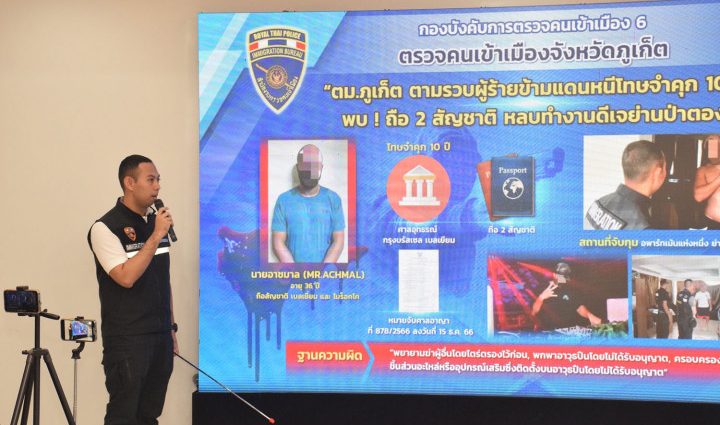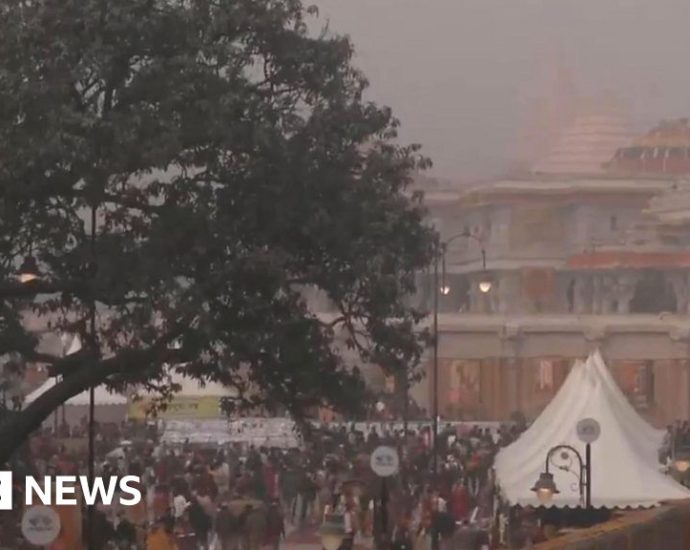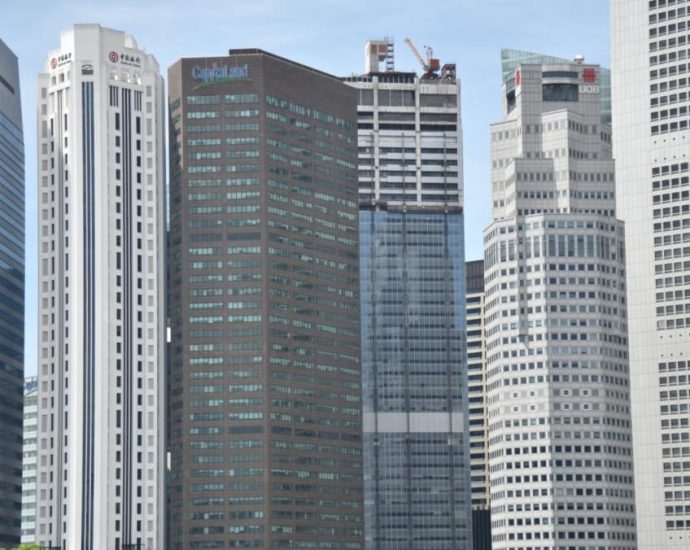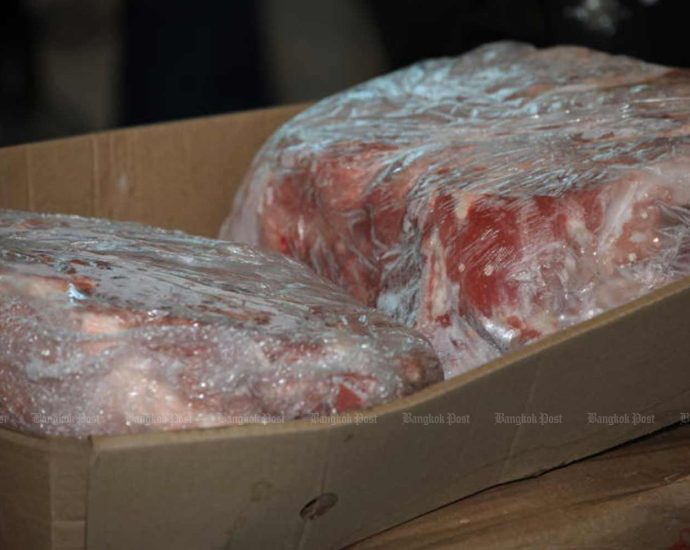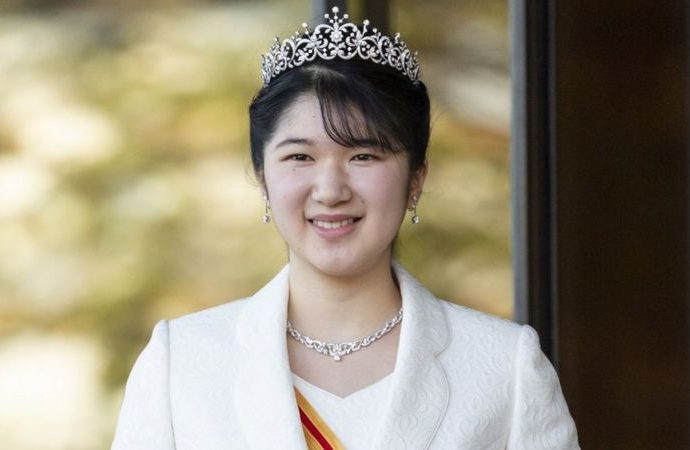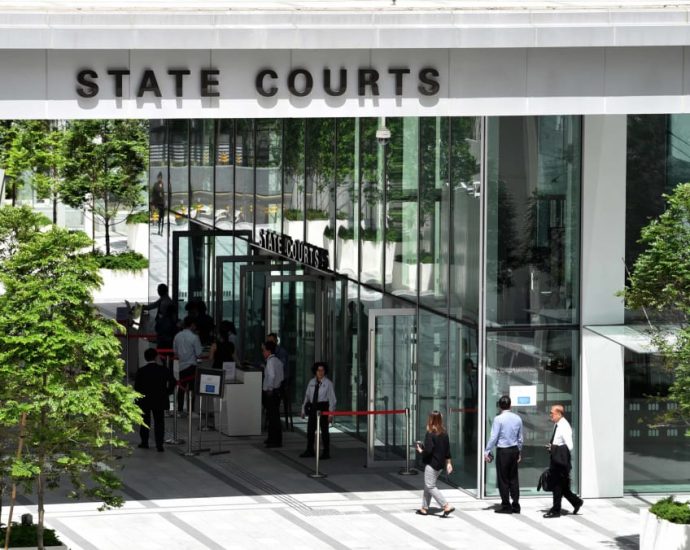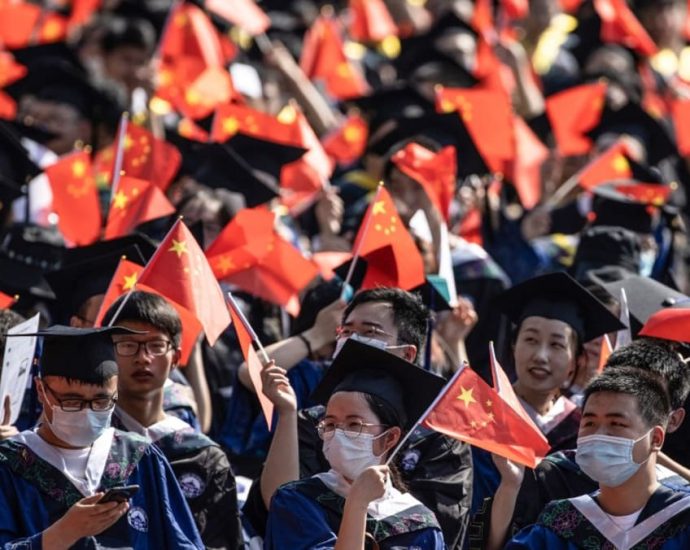Fugitive in Belgium shooting arrested in Patong
PUBLISHED : 23 Jan 2024 at 14:48

A 36-year-old fugitive sentenced to prison in Belgium for attempted murder has been arrested in Phuket, where he worked as a DJ at a Patong nightspot.
The man, identified by police only as Achmai, 36, was taken into custody by Phuket immigration police at an apartment at Patong beach, Pol Maj Gen Phanthana Nuchanart, deputy Immigration chief, said on Tuesday.
Achmal has dual Belgian-Moroccan nationality and was wanted in Belgium on charges of attempted murder, illegally carrying a firearm and illegal possession of ammunition and gun accessories. The charge related to a road-rage shooting in Belgium on Jan 19, 2014, he said.
The suspect was tracked down and arrested at the behest of the Office of the Attorney-General, whicih asked police to hand him over him to prosecutors at the International Affairs Division for extradiction to Belgium.
The Appeals Court in Brussels had sentenced the suspect to 10 years in prison, according to immigration police.
Achmal had used a Belgium passport to enter Thailand many times, police said. He also used a Moroccan passport to enter the country and kept changing his residence, staying in Bangkok, Si Sa Ket and Phuket.
He was finally tracked to an apartment in Patong beach, where he was working as a DJ at a bar in Patong.
New Zealand needs to muscle up for the New Cold War – Asia Times
When the previous government released the first-ever national security strategy last year, it forecast stormy geopolitical weather ahead. In the brief few months since then, the sky has darkened further still.
Beyond a slight rapprochement between China and the United States at the end of 2023, arms control remains poor, measures to prevent accidental war limited, and a genuinely rule-based international order patchy at best.
British foreign secretary David Cameron may have been speaking to his own government’s agenda when he said the “lights are absolutely flashing red on the global dashboard.” But the analogy still holds.
Three big issues are now rising to the boil: the war in Ukraine, tension in the South China Sea, and the widening disaster in Israel and Gaza. Each instance of global disorder touches Aotearoa New Zealand and its largely untested coalition government.
Ukraine in the balance
While New Zealand has not joined the fighting, it is not neutral on Ukraine. It has provided weapons, training and other forms of assistance – including joining actions against Russia at the International Court of Justice.
But the prognosis is not good. Russia’s military counterpunch is coming while external support for Ukraine is at risk of fading.
Defense officials in Sweden have warned their country should prepare for the possibility of conflict. A leaked plan from the German government shows it is also preparing for potential widening Russian aggression.
As a partner to NATO, New Zealand needs to consider its response should the tide of war turn against Ukraine – or worse still, spread to other countries.
New Zealand has said it is “deeply concerned” about China’s tactics over the Spratly Islands in the South China Sea. Of particular concern have been Chinese efforts to stop Philippine vessels from resupplying citizens in the islands (to which the Philippines has sovereign rights).
The Permanent Court of Arbitration has affirmed Philippine claims to its territories. Although China opposes the court decision, a clear majority – including New Zealand – either positively acknowledge or support the ruling.
New Zealand also asserts “there is no legal basis for states to claim ‘historic rights’ with respect to maritime areas in the South China Sea.”
Meanwhile, US President Joe Biden last year promised to defend the Philippines should China attack. The region – where the Chinese navy confronted a New Zealand frigate during a freedom of navigation exercise last year – remains a raw nerve.
Widening Middle East threats
The situation in Israel and Gaza is a legal, political and ethical mess that risks spilling over. New Zealand Prime Minister Christopher Luxon has already joined Australia and Canada to reiterate the need for a negotiated two-state solution and the importance of respecting international law.
However, there has so far been no mention of accountability for war crimes through the International Court of Justice or the International Criminal Court.
New Zealand’s focus has shifted to the protection of global waterways, specifically the Red Sea. With nine other countries, it has pledged to defend lives and protect the free flow of commerce in one of the world’s most critical waterways.
New Zealand has not been involved in the first military actions against Houthi rebels trying to control the sea lanes. But if things escalate, the coalition government has effectively signed up to fight a proxy group directly connected to an angry and dangerous Iran.

To meet these challenges at a practical and logistical level, New Zealand will need to invest more in its military. While the new government wants to control spending, it would be prudent to increase defense spending to at least 2% of GDP to match various allies.
It makes sense for New Zealand to focus on inter-operability and shared spending on common military platforms with its one official ally, Australia.
New Zealand can still maintain its nuclear-free policy and work for arms control while improving its own self-defense. It does not need the offensive capacity of the next generation of armaments (from AI and cyber capabilities to bioweapons), but it must have access to defenses against them.
At the same time, self-defense need not be linked to new alliances such as the AUKUS security pact. The security issues outlined here are separate, not part of one large fire. China, North Korea, Russia and Iran are close. But they are not connected by mutual military obligations.
Independence and self-defense
It might make more sense for New Zealand to join agreements like AUKUS if other like-minded countries (such as Canada, South Korea and Japan) joined at the same time.
But this might also create problems. First, it could accelerate the divide of the world into two large blocs. And second, without the kind of trade agreements with the US that other partners enjoy, New Zealand would be more exposed than most.
An independent foreign policy where each issue is treated on its own merits should still be the preferred approach. There is much to be said for working with countries that have shared values and common histories.
At the moment, some challenges warrant New Zealand’s involvement but others do not. Defending the values and agreements that underpin the United Nations and a rule-based international order is the best guide.
Simply to follow the US, come what may, is a dangerous bet, especially given the uncertainties around the presidential election in November. At the same time, not being better militarily prepared is a utopian position New Zealand can no longer afford.
Alexander Gillespie, Professor of Law, University of Waikato
This article is republished from The Conversation under a Creative Commons license. Read the original article.
Crowds at India’s new Ram temple day after opening
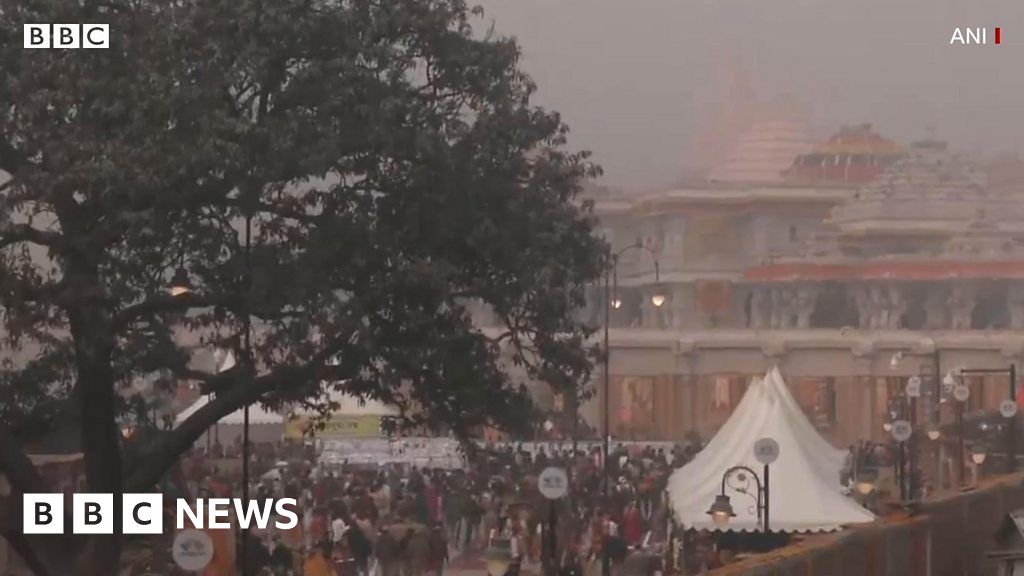
Thousands of Indian devotees have visited a new temple to Hindu god Ram in Ayodhya city on Tuesday, a day after its opening.
The temple – which replaces a 16th-century mosque razed by Hindu mobs in 1992 – was inaugurated by Prime Minister Narendra Modi in a grand ceremony on Monday. Top film stars and cricketers were among guests at the event.
Visuals from outside the temple showed thousands of devotees standing in long queues as they waited to enter the complex.
Only the ground floor of the temple is open at the moment – the rest of it is expected to be completed by the end of 2024.
Singaporeâs core inflation rises to 3.3% in December, averaged 4.2% for 2023
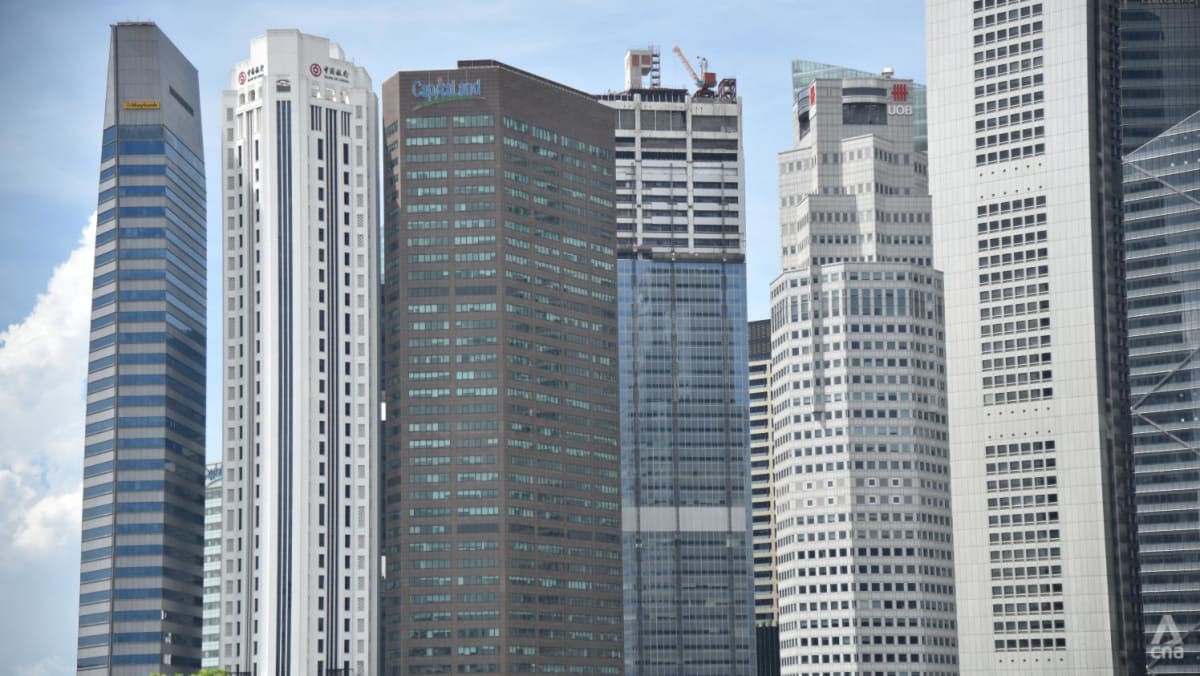
OUTLOOK
In 2024, core inflation is projected to average 2.5 per cent to 3.5 per cent. Excluding the transitory effects of the 1 percentage point increase in the GST rate to 9 per cent, core inflation is expected to come in at 1.5 per cent to 2.5 per cent.
Core inflation is expected to be affected by increases in the GST rate and increases in bus and train fares and electricity and gas tariffs in early 2024, said MAS and MTI.
“However, core inflation should resume a gradual moderating trend over the rest of the year, as import cost pressures decline and tightness in the domestic labour market eases.”
Global crude oil prices fell in the last quarter of 2023 and are expected to stabilise at around current levels.
Meanwhile, global prices for most food commodities, as well as intermediate and final manufactured goods, have continued to decline.
Prices of services associated with overseas leisure travel are also expected to moderate over the course of 2024 as supply conditions in international hospitality industries improve.
“These factors, alongside the stronger S$ trade-weighted exchange rate, should continue to temper Singapore’s imported inflation in the quarters ahead,” said MAS and MTI.
Locally, unit labour costs are expected to rise at a slower pace in tandem with the gradually cooling labour market. Businesses are likely to continue passing through higher labour costs to consumer prices, but at a more gradual pace.
COE premiums have been volatile notwithstanding further increases in the COE quota since November 2023.
“Upside risks to inflation remain, including from fresh shocks to global energy and shipping costs due to geopolitical conflicts, higher food commodity prices from adverse weather events, as well as more persistent-than-expected tightness in the domestic labour market,” MAS and MTI said.
“At the same time, an unexpected weakening in the global economy could induce a faster easing of cost and price pressures.”
Major probe into meat smuggling
PUBLISHED : 23 Jan 2024 at 13:43

The Department of Special Investigation will examine three-years of meat import records and question agriculture officials in a major probe into meat smuggling.
Acting director-general Pol Maj Yutthana Praedam said on Tuesday the DSI would question agriculture officials about imports of pork, beef and chicken from Jan 1, 2021, until the present.
This questioning was prompted by the testimony of a man who surrendered to police at Don Mueang airport on returning from China on Monday, according to Pol Maj Nathapol Disayatham, chief of DSI interrogators.
The man, known as Hia Kao, was one of five people the DSI suspected of smuggling chicken feet to China.
Hia Kao admitted knowing officials at the Agriculture Ministry but denied all charges. He was released on condiitional bail of 200,000 baht, prohibited from leaving the country, Pol Maj Yutthana said.
The DSi released no further details.
Japan’s Princess Aiko to begin work at Red Cross upon graduation
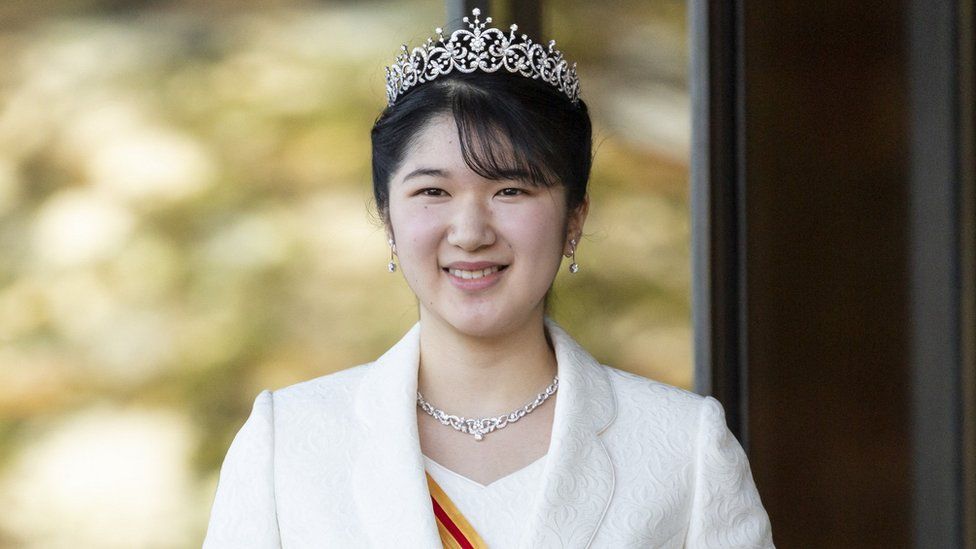 Getty Images
Getty ImagesPrincess Aiko, the only child of Japan’s Emperor Naruhito, will begin work at the Japanese Red Cross Society in April after graduating from university.
While details of her new role are unclear, she will continue official duties with the imperial family.
The 22-year-old princess is not in line of succession as Japanese law allows only men to ascend to the throne.
Japan has the oldest continuing hereditary monarchy in the world.
In a statement, Princess Aiko said that she has “always had an interest” in the Red Cross, while her new employer added that it wants “to thoroughly make preparations so that the princess can work at ease”.
The organisation has close ties with the imperial family, with previous empresses serving as honorary presidents.
In October, Princess Aiko visited the society with her parents to observe an exhibition on its relief activities following the 1923 Tokyo earthquake. In recent years, she has also expressed her sympathies to victims and survivors of natural disasters in Japan.
She is currently in her final year of study at Gakushuin University’s Faculty of Letters, majoring in Japanese language and literature. The princess is generally well regarded by the Japanese public, many of whom have welcomed her new role.
‘Career woman’ mother
Princess Aiko’s mother, Empress Masako, is known as a “career woman” princess and empress in Japan.
Educated at Harvard and Oxford, the empress is a former diplomat fluent in several languages.
In 1993, she became only the second commoner, after former Empress Michiko, to marry the first in line to the Japanese throne.
But once married, speculation raged over if and when she would produce a male heir.
This video can not be played
To play this video you need to enable JavaScript in your browser.
The birth of Princess Aiko in 2001 was much celebrated but did not resolve the succession issue.
The Japanese government then began debating whether to change the law to allow women to ascend to the throne.
Five years later, Emperor Naruhito’s younger brother welcomed a baby boy, Prince Hisahito, to avert the succession crisis.
But the pressure on then Crown Princess Masako was evident as she disappeared from public view for more than a decade.
In 2004, then Crown Prince Naruhito told journalists in unusually strong comments that his wife had “completely exhausted herself” trying to adapt to palace life.
The palace then announced that the princess was suffering from an “adjustment disorder”, widely assumed to be a reference to depression.
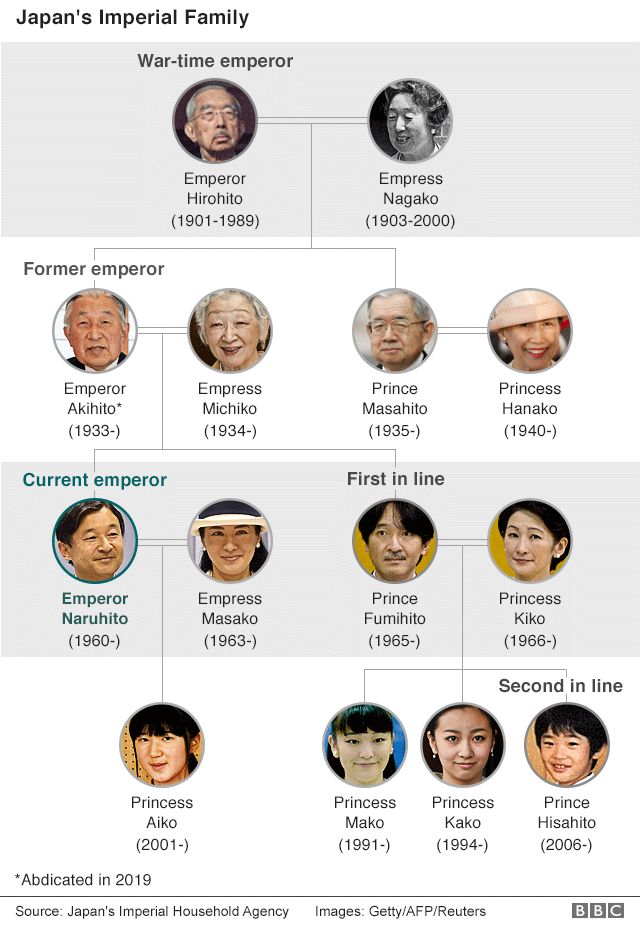
Tabloid coverage
In recent years, the family of Prince Hisahito, who is second in line to the throne after his father, has attracted much coverage by Japanese tabloids.
His older sister, former princess Mako, married a commoner, Kei Komuro, and moved to the US after leaving the imperial family.
An alleged money dispute between Mr Komuro’s mother and her former fiancé, who claimed mother and son had failed to repay a debt to him, almost threatened their marriage as public perception of the couple soured.
Mr Komuro’s New York state bar exam results were treated as breaking news in Japan until he passed on his third try in 2022.

The tabloid spotlight on the Akishino family has meant that local media often makes comparisons between the princesses.
When Princess Aiko was asked about her cousin Princess Mako’s marriage in 2022, she said: “For me, marriage still seems far in the future and I haven’t really thought of it. I have no particular thought of my ideal partner, but (the ability to) make each other smile seems perfect.”
Related Topics
-
-
26 April 2019
2:10
-
-
-
1 May 2019
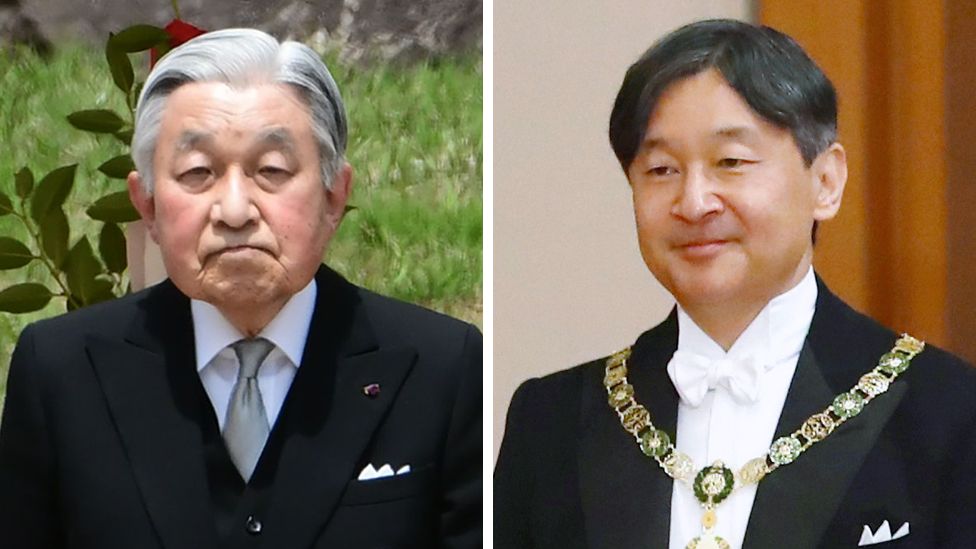
-
-
-
9 June 2017
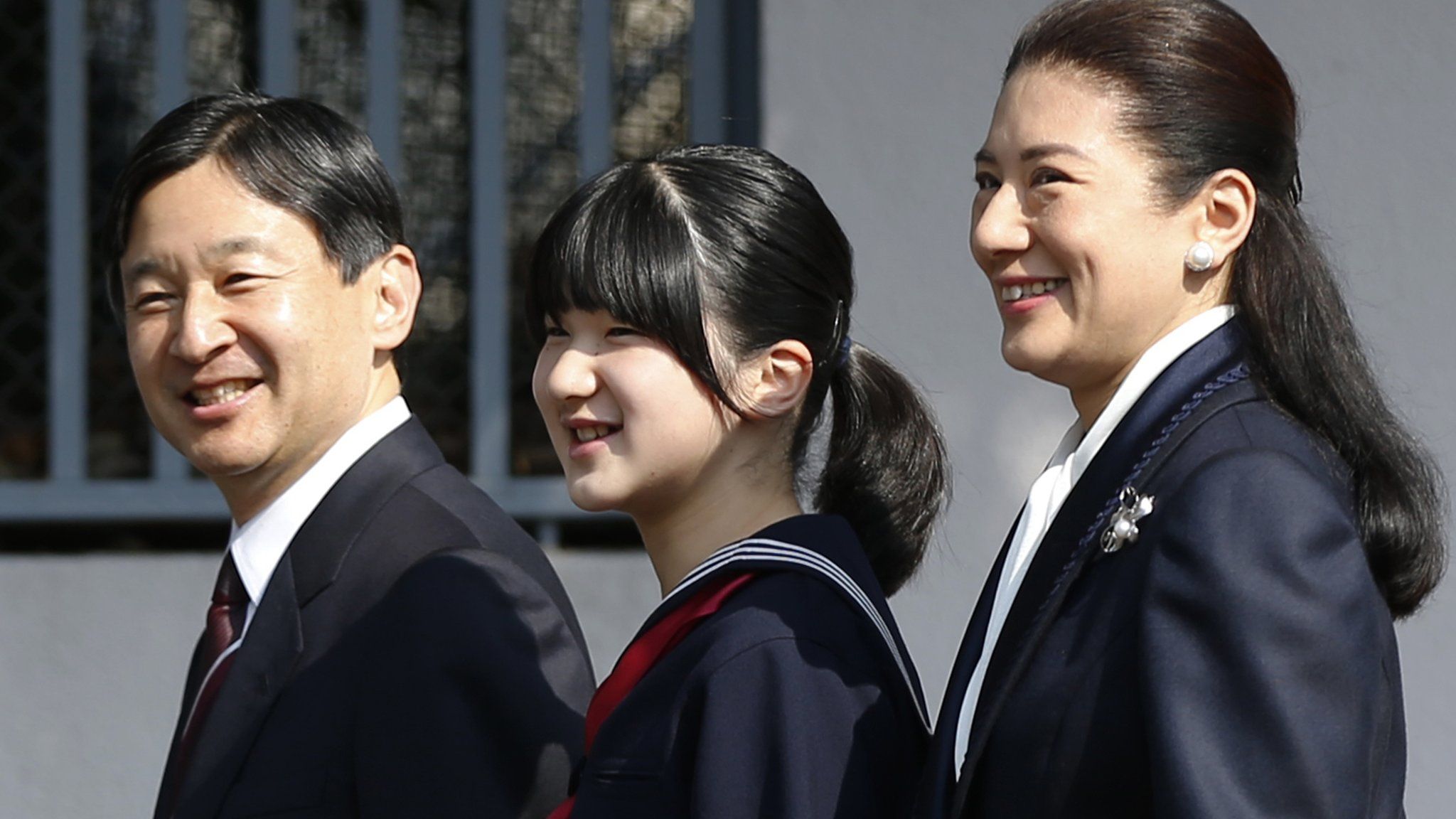
-
-
-
14 November 2021

-
Malaysian actor Jack Lim hits man caught allegedly taking upskirt photos at event

Malaysian actor and radio deejay Jack Lim has won praise and support for hitting a man who was caught allegedly taking upskirt photos at a meet-and-greet event in Malaysia on Friday (Jan 19).
While promoting his upcoming movie, Lim noticed a man who kept moving a paper bag towards the skirts of several female artistes.
Speaking to Singapore news outlet Shin Min Daily News, Lim said that Malaysian singer Henry Teo was alerted to the man and proceeded to chase him.
“Unfortunately, the man was running too fast and (Henry Teo) could not catch up with him. Luckily, food delivery drivers assisted and stopped the man in the parking lot,” recalled Lim.
The man was then brought back to the scene of the crime. His paper bag had a hole for his phone to record the videos.
Lim added: “He couldn’t delete (all of the videos). As soon as I turned on the phone, I saw a lot of videos. I believe many of my artistes have been secretly filmed by him on different occasions. He is a habitual offender.”
Man corruptly accepted job and CPF contributions for his wife from business associate, gets fine
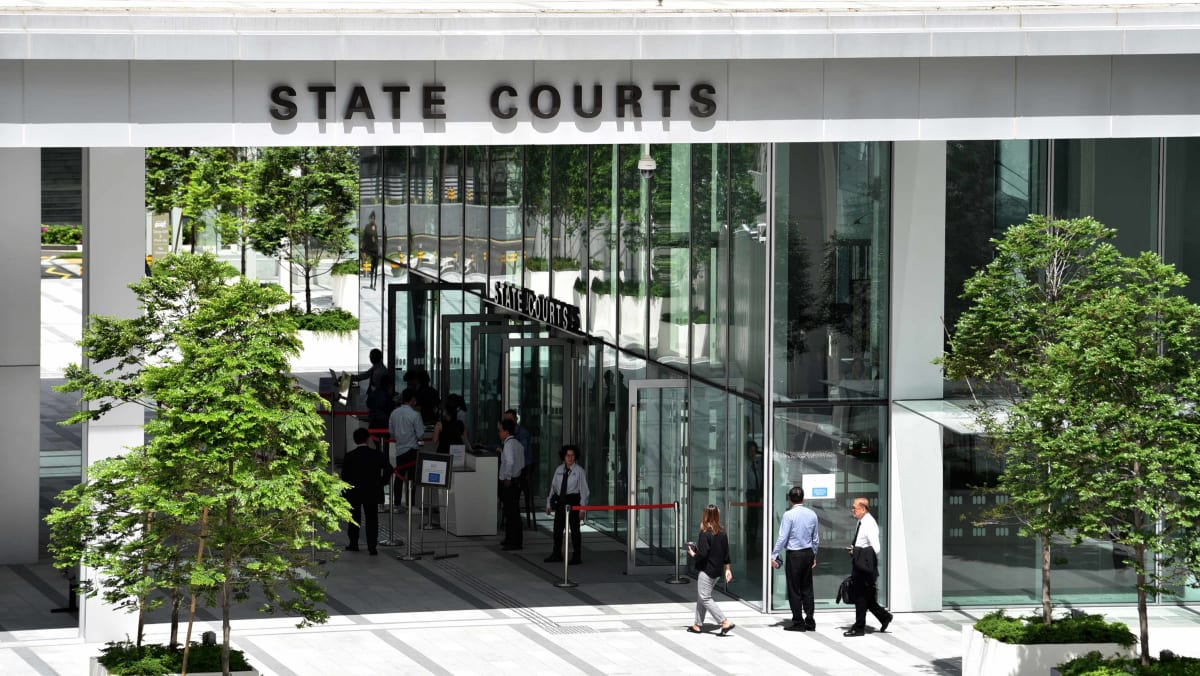
SINGAPORE: A section manager working for lift company Mitsubishi Elevator (Singapore) was close friends with a director at a firm performing sub-contracted jobs for Mitsubishi Elevator.
But the friendship took on a corrupt tone when the director began paying off the gambling losses made by the manager, and even offered the manager’s wife a job with salaries and Central Provident Fund (CPF) contributions.
The manager, 47-year-old Singaporean Lee John Chieh, was fined S$20,000 (US$14,930) by a district court on Tuesday (Jan 23) after pleading guilty to one count of corruptly accepting gratification under the Prevention of Corruption Act.
The court heard that Lee was the section manager of the installation and testing department at Mitsubishi Elevator Singapore and managed the daily operation of lift installation projects.
He got to know co-accused Yu Zhongjian, a 51-year-old Singaporean, in 2015 or 2016 when Yu’s company MSP Lift Engineering was a subcontractor for Mitsubishi Elevator.
Yu’s company provided lift installation and repair services to other companies including Lee’s firm.
The two men became closer when they worked together representing their companies on the Selective Lift Replacement Programme in Choa Chu Kang and Ang Mo Kio, a government programme replacing old lifts with modern ones.
In mid-2019 to end-2021, Lee went for about 50 gambling sessions with Yu and Yu’s colleagues in Yu’s office.
Lee actively avoided telling any of Yu’s colleagues what his job was, as he did not want to disclose that he had a working relationship with Yu.
The gamblers would total their winnings and losses at the end of the night and settle their losses in cash.
During at least five of these sessions, Lee did not have the cash to settle his losses and Yu would step in to pay them off. Lee never repaid the money, and Yu never asked for it back.
The payments came up to about S$1,000.
THE JOB OFFER
In February or March 2020, Yu suggested to Lee that his unemployed wife take up a job with Yu’s company.
He suggested a nominal salary of S$1,184, with CPF contributions. Yu made this suggestion as the employment of Lee’s wife, being a Singaporean, would allow the company to receive CPF contributions which could be used to apply for foreign workers.
Yu told Lee that his wife would need to go to the office only occasionally, to be present during checks conducted by the Manpower Ministry.
Lee’s wife agreed to the proposal and was hired by the company for seven months between April 2020 and October 2020.
Across that period, she received S$8,288 in salary and S$3,836 in CPF contributions, for a total sum of S$12,124.
Lee’s wife seldom went to the office. By the end of January 2021, she found another job.
Lee then told Yu to stop paying his wife salary and CPF contributions. He offered to return the money paid to his wife, but Yu rejected the offer.
As a result of the payments received by himself for his gambling and his wife for her job, Lee’s judgment was clouded.
In effect, he exercised leniency when dealing with projects by Yu’s company.
Yu also knew this. He knew that Lee would help him and be a “friendly force” for his company, and believed that Lee was one of his company’s “people”, court documents stated.
THE HDB LIFT-TERM PROJECT
In 2021, Lee’s company was appointed as the contractor of the 29th Lift-Term Project for the Housing Board (HDB) – a S$40 million project involving the installation of 300 lift units for HDB Build-To-Order projects.
In end-2021, Lee’s company was considering choosing between two competing subcontractors – including Yu’s firm – to fit lights for the lifts.
The company asked Lee to provide a comparison between the lights sold by the two companies.
In a tabulated comparative analysis, Lee stated that the lights from Yu’s company were more suitable in terms of wattage, built quality and size.
He claimed that the lights by the other company failed certain test requirements and recommended Yu’s company, despite the lights costing S$5 more per piece than the other company’s.
In truth, there was no evidence that the competing company’s lights had failed the requirements. Both sets of lights were comparable in terms of safety standards.
Lee had made that analysis because he deliberately favoured Yu’s company, the court heard.
After the flawed recommendation was made, Lee’s company discovered the offence and Lee was fired that same month in December 2021.
The company did not buy the lights from Yu’s company.
In June 2022, Lee surrendered the sum of S$12,124 to the Corrupt Practices Investigation Bureau (CPIB).
Deputy Public Prosecutor Hidayat Amir sought a fine for Lee, leaving the quantum to court.
The corruption charge is punishable by a maximum fine of S$100,000, up to five years’ jail, or both.
The offence was discovered by another employee and was not a result of Lee coming forward in a sign of remorse, said Mr Hidayat.
MITIGATION
Defence lawyers from Lighthouse Law – Mr Adrian Wee, Ms Lynette Chang and Mr Matthew Low – similarly sought a fine for their client.
Mr Wee said his client is a father of two with a bachelor’s degree in mechanical and production engineering from Nanyang Technological University.
The lawyer said Lee’s wife was out of a job during the COVID-19 pandemic, and Yu suggested that she work for his company.
Yu did not make any express requests of Lee in exchange for the gambling loans or for employing Lee’s wife, said Mr Wee.
On the 2021 Lift-Term Project, Mr Wee said his client was partly motivated by the fact that the lights supplied by Yu’s company were superior in durability and easier to install.
Lee also believed that the end-user – HDB – would have incurred no additional costs since the lights were a component of the lift and supplied pursuant to a lump sum contract.
Thus, HDB would also benefit from having lights that were more durable and easier to maintain, said Mr Wee.
The tabulated comparative analysis was prepared after Lee consulted his company’s in-house professional engineer and his own superior, said the lawyer.
Lee was allowed to pay his fine in two instalments.
Yu is set to plead guilty in March.
China’s influence on Myanmar insurgents only goes so far – Asia Times
A shaky agreement to end fighting in northern Myanmar has served to highlight concerns in Beijing over the ongoing unrest – and the limits of China’s power to influence the ongoing civil war.
On January 12, 2024, China announced that it had brokered a cease-fire between the Myanmar military and a trio of ethnic armies, known as the Three Brotherhood Alliance.
There is, however, one caveat: The agreement only applies to the northern Shan state. The state has seen conflict since Myanmar’s independence in 1948, and especially after the once-Beijing-backed Burma Communist Party established its headquarters there in 1968 and engaged the country’s army in a prolonged war.
It is also a region where opposition to Myanmar’s military government has had the most success in the current civil war. Since launching a fresh push against the Myanmar military on October 27, 2023, the alliance has captured one town in Shan state every three days, according to media reports.
And despite the China-brokered agreement, sporadic fighting has continued in Shan state. Meanwhile, the truce has done nothing to end the civil war outside the state.
But that might not be the point: The agreement brokered by Beijing is, I believe, more about trying to safeguard the interests of China than about ushering in elusive peace to Myanmar. Beijing has increasingly been concerned over the threat of Myanmar’s turmoil spilling over into China.
Indeed, a statement by the Chinese foreign ministry announcing the truce noted that both sides in the conflict had “committed to not harming the safety of Chinese border residents and personnel involved in projects in Myanmar.”
There are clear reasons why China would like to see peace in Myanmar. The destabilized northern region has become a haven for Chinese criminal gangs that traffic humans and drugs, and run online scams from across the border.
Meanwhile, the war has blocked trade routes and seen Chinese citizens in border towns increasingly put at risk.
Military under siege
Regardless of China’s desire to see the truce hold, there appears little chance of that happening. Myanmar’s army has faced major losses since fighting began in 2021, sparked by a coup in which the country’s generals overthrew the democratically elected government.
Since then, a fierce resistance movement has emerged across Myanmar – one the generals have failed to subdue.
The recent truce has done little to end the violence, opposition successes or the threat to China. A day after the cease-fire was announced, one member of the Three Brotherhood Alliance, the Arakan Army, captured Paletwa, a border town with India in the west of Myanmar.
Meanwhile, the Kachin Independence Army shot down a China-made fighter jet – the third one in just a few weeks – and the Myanmar army lost control of one of its division headquarters in the cease-fire area.
In southeast regions of Myanmar bordering Thailand, the Karenni Nationalities Defense Forces and allied fighters launched “Operation 1111,” expanding their territorial and administrative control in the region. And in the central plains, the People’s Defense Forces, an umbrella resistance group, continues to engage in guerrilla warfare against the military.

Dwindling Chinese influence
In the context of the sprawling civil war, China has found itself in uncharted territory.
In the past, China has been able to exert its influence over Myanmar’s politics. But the civil war has seen the emergence of new resistance groups, such as the People’s Defense Forces, most of whose members are younger than the soldiers in established armies. And they have no intention of entering any agreement with the Myanmar military – despite the entreaties of Beijing.
Moreover, these new groups have made strategic and logistic links beyond Myanmar’s borders, giving them access to smuggled arms and supplies.
As such, China’s influence over Myanmar is constrained. This is even more so given the ethno-nationalism underpinning much of the fighting in Myanmar. Chinese efforts to end the fighting do little to provide solutions to tie the disparate ethnic groups in Myanmar together.
In fact, the one thing binding the ethnic groups that form the Three Brotherhood Alliance is the common goal of defeating the Myanmar army.
In addition, the safety of Chinese citizens in regions across the Myanmar border cannot be guaranteed by the cease-fire agreement with the military. The army’s inability to tackle criminal gangs in Shan state prior to the civil war suggests that even without warfare, the region will continue to pose a threat to China.
Meanwhile, China’s relationship with, and influence over, groups in northern Myanmar has changed as a result of the civil war.
Take the Myanmar National Democratic Alliance Army (MNDAA), a resistance group in the Kokang region that borders China’s Yunnan province and shares linguistic and cultural ties with China. Since being formed in 1989, its support has switched back and forth from the Myanmar government to the resistance groups – as has China’s.
But the MNDAA cannot be viewed as a vassal state of China. In 2019, the MNDAA joined the Three Brotherhood Alliance with the Arakan Army and Ta’ang National Liberation Army, groups with different cultural and linguistic backgrounds.

China’s diplomacy and influence over the Three Brotherhood Alliance is limited: A truce threatens the unity that the group has developed in opposition to the military.
And there is little incentive among the Three Brotherhood Alliance to stop fighting at a time when it appears to be on the front foot, and morale among Myanmar’s soldiers is low.
Entering the truce is in itself risky for the alliance, as it may threaten the group’s standing with other armed groups – many of whom China never dealt with until 2021.
Losing faith in the junta
As such, Beijing’s power to influence Myanmar’s ethnic resistance groups is limited. But there is another reason why the truce Beijing brokered may not hold: Beijing’s desire to give any support to the military government has its limits, too.
China is losing patience with the Myanmar military, which has failed to crack down on criminal gangs that have targeted Chinese citizens. As many as 120,000 people, many of them Chinese citizens, have been trafficked into Myanmar by these organizations to help operate online scams.
China’s default position on Myanmar has traditionally been to support whoever is in power. And Beijing had a good relationship with the democratic government under Aung San Suu Kyi prior to the 2021 coup.
The corruption and non-governability of Myanmar’s border towns since then threaten the safety of Chinese citizens and undermine any faith China has in the military’s ability to deliver stability.
If Myanmar’s military cannot stabilize northern Myanmar, China is in a difficult situation. The status quo – with the Myanmar military in power, but unable to subdue resistance movements – will continue to present a threat to China.
Tharaphi Than is Associate Professor of World Cultures and Languages, Northern Illinois University
This article is republished from The Conversation under a Creative Commons license. Read the original article.
Harsh but true? Chinese blogger hits a liberal arts nerve in a tough job market
Chinese education blogger Zhang Xuefeng was direct and damning when a woman asked him during a live stream whether her son should choose to study liberal arts at university. Zhang, who has more than 24 million followers on Douyin, the Chinese version of TikTok, is a regular source of adviceContinue Reading

